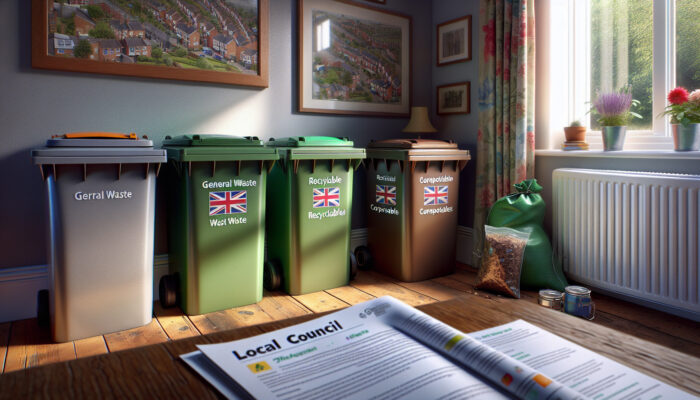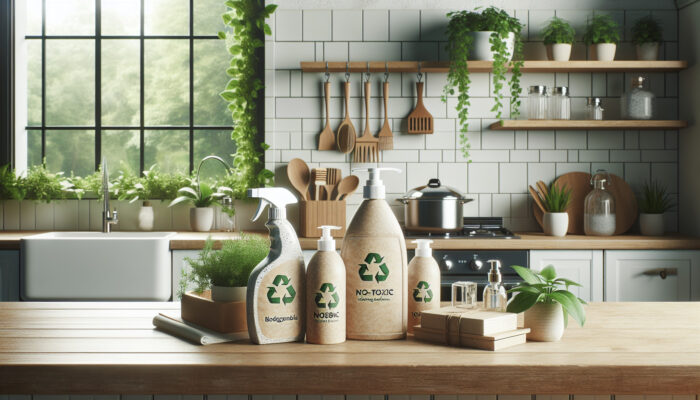Implement Proven Techniques to Reduce Waste and Promote Recycling Practices at Home in the UK
Enhance Recycling Success by Improving Waste Sorting and Separation Methods

In the UK, every household produces a considerable volume of waste, but by honing the skill of sorting and categorising this waste, families can unlock significant advantages for both the environment and their local communities. The fundamental principles of green budgeting tips for house clearance emphasise the necessity of reducing landfill contributions while enhancing recycling initiatives. By methodically classifying waste into three essential categories—general waste, recyclable materials, and compostable items—households can greatly improve local waste management efforts. Many local councils offer detailed guidelines outlining which materials are recyclable, assisting households in adhering to regulations and actively participating in the creation of a cleaner and more sustainable environment.
Creating a robust waste sorting system is crucial for any household aspiring to foster sustainability. This system should encompass clearly marked bins specifically designated for paper, plastics, metals, and organic materials. This straightforward yet transformative strategy not only promotes responsible waste disposal but also cultivates a culture of sustainability within the household. Involving children in the sorting process can instil eco-friendly behaviours from an early age, ensuring that they develop a strong sense of environmental responsibility as they grow. Ultimately, the more effectively waste is sorted, the greater the volume of materials diverted from landfills, leading to a healthier planet for future generations to flourish.
Optimise the Use of Local Recycling Facilities to Foster Sustainable Living
Maximising the potential of local recycling facilities is integral to the pursuit of sustainable living practices across the UK. Numerous communities feature dedicated recycling centres that accept a wide array of materials, including electronics, plastics, and garden waste. Familiarising oneself with these facilities can greatly enhance the effectiveness of any green budgeting tips for house clearance. For example, local councils frequently maintain informative websites that specify the exact items accepted at their recycling centres, aiding residents in planning their clearances and ensuring compliance with local waste disposal regulations.
Moreover, many councils provide collection services specifically for bulky items, alleviating the burden on residents who would otherwise need to transport larger items to recycling centres personally. This service not only saves valuable time but also contributes to reducing the carbon emissions linked to transportation. Residents are encouraged to check their council’s website for information regarding collection schedules and the types of items eligible for pickup. By leveraging these local resources, households can effectively decrease their environmental impact while conducting thorough house clearances, thereby nurturing a more sustainable community.
Revitalise Old Furniture with Innovative Upcycling Techniques
In an era dominated by mass production, upcycling furniture has emerged as a creative and sustainable approach to both reducing waste and managing finances effectively. The process of transforming dated, worn-out furniture into stylish new pieces is not only a savvy financial choice but also aligns perfectly with the principles of green budgeting tips for house clearance. Many residents across the UK have eagerly embraced this trend, showcasing their unique creations on social media platforms and at local craft fairs, thereby fostering a vibrant community grounded in creativity and sustainability.
Upcycling encompasses a broad spectrum of projects, ranging from simple refinishing jobs to more elaborate transformations. For instance, an old wooden chair can be transformed into a chic garden seat with just a fresh coat of paint and some comfortable cushions. This creative endeavour not only conserves financial resources but also reduces the demand for newly manufactured furniture, which typically has a substantial carbon footprint due to its production processes. Local workshops frequently offer courses on various upcycling techniques, providing individuals with the opportunity to learn new skills while cultivating a sense of community and shared responsibility towards sustainability.
Adopt Composting Practices for Effective Organic Waste Management

Composting has become an essential practice for promoting sustainable living within UK households. By converting kitchen scraps and garden waste into nutrient-rich compost, families can significantly reduce their contributions to landfill sites. This transformative process enriches the soil and encourages sustainable gardening practices, making it a vital element of green budgeting tips for house clearance that every household should consider adopting.
To initiate composting, designate a specific area in your garden or utilise a compost bin to collect organic materials such as vegetable peels, coffee grounds, and grass cuttings. Over time, these materials will decompose into rich compost, perfect for nourishing garden plants. Many local councils throughout the UK offer valuable composting resources and even subsidised compost bins for residents, facilitating the transition to composting. Engaging in composting not only promotes a healthier garden but also contributes to a circular economy by returning nutrients to the soil, reinforcing the interconnectedness of local ecosystems.
Integrating Energy-Efficient Techniques to Improve House Clearance Processes
Effective Methods to Reduce Energy Consumption During House Clearances
When undertaking a house clearance, implementing strategies aimed at minimising energy consumption can substantially decrease both expenses and environmental impacts. Households throughout the UK have a wealth of energy-saving practices available to them, such as employing energy-efficient lighting during the clearance process. Transitioning to LED bulbs not only reduces energy consumption but also lowers heat output, creating a more comfortable environment for sorting through items without discomfort.
Additionally, conducting clearances during daylight hours by leveraging natural light instead of electric lighting is another effective way to conserve energy. When moving items, it is advisable to utilise efficient packing techniques to ensure that vehicles are fully loaded. This practice not only minimises the number of trips required but also conserves fuel, thereby decreasing carbon emissions. Understanding how to incorporate energy-efficient practices into your clearance can significantly enhance the effectiveness of green budgeting tips for house clearance and contribute to a more sustainable future.
Choosing Eco-Friendly Cleaning Products for a Healthier Home Environment

Cleaning is often an essential aspect of the house clearance process; however, it does not necessitate the use of harsh chemicals that can be harmful to the environment. The UK market is increasingly filled with eco-friendly cleaning products that deliver effective results without the negative environmental consequences typically associated with traditional cleaners. An increasing number of households are opting for biodegradable and non-toxic cleaning agents, significantly contributing to a greener home environment.
Utilising eco-friendly products not only guarantees a clean living space but also reinforces a broader commitment to sustainability. Seek out cleaning supplies that are packaged in recyclable materials or are concentrated to reduce waste. Furthermore, homemade cleaning solutions made from vinegar, baking soda, and essential oils can be just as effective and far more economical. This approach aligns perfectly with green budgeting tips for house clearance, empowering households to save money while nurturing a healthier living environment.
Streamlining Packing and Moving Techniques for Maximum Efficiency
Implementing efficient packing and moving techniques is crucial for reducing energy consumption throughout the house clearance process. Households can enhance their clearance efficiency by employing strategic packing methods that optimise space in vehicles. Using sturdy boxes and reusable containers significantly diminishes reliance on single-use packing materials, resonating with the philosophy of green budgeting tips for house clearance and promoting sustainability.
Moreover, consider hiring local moving services that prioritise sustainability. Many companies in the UK now offer eco-friendly options, including vehicles that utilise alternative fuels and packing materials made from recycled resources. Engaging with community resources, such as borrowing moving supplies or collaborating with friends, can further enhance the efficiency of the moving process while also reducing costs, making your house clearance an environmentally conscious endeavour.
Discovering Efficient Ways to Sell and Donate Unwanted Items in the UK
Utilising Online Selling Platforms for Effective Decluttering
The rise of online selling platforms has transformed the way unwanted items are disposed of during house clearances. In the UK, platforms such as eBay, Gumtree, and Facebook Marketplace provide excellent opportunities for households to sell items they no longer require, effectively turning clutter into cash. This practice not only aligns with green budgeting tips for house clearance but also supports a circular economy by facilitating the reuse of items by new owners.
When listing items for sale, it is crucial to include comprehensive descriptions along with high-quality images to attract potential buyers. Reasonably pricing items, taking into account their condition and current market demand, is equally important. Local selling groups on social media can serve as excellent avenues for reaching buyers in your area, streamlining the process while promoting sustainability within the community.
Contributing Usable Items to Charity Shops for Community Support
Donating usable items to charity shops presents a rewarding opportunity to support local communities while simultaneously reducing waste. Numerous charity shops across the UK are eager to accept clothing, electronics, and household items, offering a responsible option for those wishing to declutter. This practice seamlessly aligns with green budgeting tips for house clearance, helping divert items from landfills while providing support to those in need.
Before donating, it is advisable to check with local charities to ascertain their specific needs, as some shops may not accept certain items. Many charities also provide complimentary pickup services for larger donations, making it even more convenient for households to contribute. Participating in charitable giving not only benefits others but also fosters a sense of community and environmental consciousness among residents, enhancing the social fabric and collective spirit of society.
Engaging in Local Auctions and Sales for Sustainable Disposal Options
Participating in local auctions and sales is an exciting opportunity to sell unwanted items while promoting sustainable living practices throughout the UK. Many towns host regular auctions and sales where residents can bring unwanted items to be bid on or sold. This not only allows individuals to recover some of their clearance costs but also nurtures a culture of reuse within the community, perfectly aligning with green budgeting tips for house clearance.
Before participating, it is wise to research local auction houses and consult their schedules to ensure preparedness. Items that typically perform well at auction include antiques, collectibles, and unique household goods. Engaging with local auction communities can also provide valuable insights regarding which items are most likely to sell and effective presentation techniques that enhance their visual appeal, ensuring a successful sale event.
Maximising Sales Opportunities at Car Boot Sales and Community Markets
Car boot sales and local markets are quintessentially British venues for selling unwanted items while embracing sustainable principles. These events provide a platform for sellers to connect with local buyers, ensuring that items find new homes instead of being discarded in landfills. Participating in car boot sales aligns perfectly with green budgeting tips for house clearance, while also fostering community engagement and interaction among residents.
To maximise success at these events, consider the presentation of items. Using tables or blankets to display goods can attract more buyers. Additionally, engaging with potential customers through friendly conversation can enhance the overall experience and lead to increased sales. Car boot sales not only assist in decluttering but also promote a shared commitment to reducing waste among community members, strengthening the bonds within neighbourhoods.
Identifying Affordable Transport Solutions for Efficient House Clearance
Leveraging Public Transport as a Cost-Effective Clearance Strategy
Utilising public transport for house clearance is not only a budget-friendly approach but also an environmentally responsible choice. UK cities typically feature robust public transport networks that can be leveraged to transport smaller items during clearances. Buses, trains, and trams provide an excellent means of reducing carbon emissions while saving money on fuel and parking fees, fitting seamlessly within the framework of green budgeting tips for house clearance.
Effective planning is essential when employing public transport for moving items. Ensure that items are appropriately packed and that transport schedules are adhered to in order to avoid delays. For instance, during peak times, services may be busier, making it more challenging to manage larger items. However, by taking advantage of off-peak services, households can transport their belongings efficiently without the added stress of traffic congestion, resulting in a smoother and more organised clearance process.
Choosing Eco-Friendly Vehicle Rentals for Transporting Larger Items
For larger items that require transportation, hiring eco-friendly vehicles can significantly enhance the sustainability of a house clearance initiative. Numerous rental companies in the UK now offer vehicles that utilise alternative fuels or electric engines, thereby substantially reducing carbon footprints. This option aligns seamlessly with green budgeting tips for house clearance, endorsing a more sustainable approach to moving and minimising environmental impacts.
When considering vehicle rental, it is important to compare various options to ensure you choose the most efficient vehicle for your clearance needs. Pay close attention to factors such as fuel efficiency and emissions ratings of the vehicles. Additionally, some rental companies may provide reusable packing materials, further contributing to a sustainable process while lowering the environmental impact of your clearance efforts.
Collaborating Through Car Sharing and Community Support for Enhanced Clearance Efficiency
Engaging in car sharing and seeking community assistance can yield significant benefits during a house clearance. Numerous local initiatives in the UK promote resource sharing among residents, including vehicles for transporting items. This not only reduces costs but also enhances community spirit, embodying the essence of green budgeting tips for house clearance and reinforcing connections within neighbourhoods.
Consider reaching out to neighbours or local community groups to identify individuals willing to lend a hand or share their vehicle. Many communities have online groups where residents can coordinate support for such projects. This not only fosters relationships among community members but also reduces the number of vehicles on the road, contributing to lower emissions overall and creating a more sustainable local environment.
Implementing Sustainable Storage Solutions for Organised Living Spaces
Selecting Eco-Friendly Storage Units to Promote Sustainable Practices
Choosing sustainable storage units is essential for those aiming to minimise their environmental impact during house clearances. Many storage facilities in the UK are increasingly adopting green practices, such as utilising renewable energy sources and sustainable materials in their construction. Opting for these eco-friendly storage solutions aligns perfectly with the principles of green budgeting tips for house clearance and supports broader sustainability goals.
When selecting a storage unit, inquire about the facility’s energy efficiency measures, such as the installation of solar panels or energy-efficient lighting systems. Additionally, seek out units that offer flexible contracts, allowing for quick access to belongings without the burden of long-term commitments. By choosing sustainable storage options, households can contribute to energy conservation while securely storing their items and minimising their overall carbon footprint.
Exploring DIY Storage Solutions for Creative and Cost-Effective Organisation
Implementing DIY storage solutions presents an innovative and cost-effective approach to managing clutter while fostering sustainability. Numerous households across the UK are increasingly turning to creative methods to repurpose items they already possess, such as transforming old crates into shelving or converting suitcases into stylish storage options. This approach not only saves money but also embodies the principles of green budgeting tips for house clearance, promoting creativity and resourcefulness in home organisation.
Engaging in DIY projects can also serve as a gratifying way to spend time with family members and cultivate practical skills. Consider involving children in the creative process of developing storage solutions, imparting valuable lessons while nurturing their creativity. Additionally, sharing these DIY projects on social media platforms can inspire others within the community to explore their own sustainable storage options, further promoting a culture of innovation and environmental awareness.
Strategies for Minimising Storage Requirements Through Effective Decluttering
Reducing the need for storage can greatly simplify the clearing process. Effective decluttering strategies, such as the Marie Kondo method, encourage individuals to critically evaluate their possessions and determine what truly brings joy or serves a purpose in their lives. This approach seamlessly aligns with green budgeting tips for house clearance, fostering mindfulness in consumption practices and promoting a more intentional living environment.
Set aside dedicated time to systematically go through belongings, categorising items into keep, donate, or recycle piles. This method not only streamlines the clearance process but also cultivates a more intentional living environment. By minimising the number of items requiring storage, households can create a more organised and sustainable home space, ultimately leading to improved well-being and reduced stress levels.
Embracing Green Renovation and Repair Practices for Sustainable Living
Utilising Eco-Friendly Materials for Responsible Renovation Projects
Incorporating eco-friendly materials during renovations is a crucial step towards adopting sustainable home improvement practices. The UK market presents a diverse array of sustainable building materials, such as reclaimed wood, bamboo, and recycled metal. These choices not only lessen the environmental impact of renovations but also align perfectly with the ethos of green budgeting tips for house clearance, promoting sustainability and responsible consumption.
When planning renovations, consider sourcing materials locally to minimise transportation emissions and support local economies. Many suppliers now offer eco-certified products, ensuring that renovations contribute positively to both environmental sustainability and public health. Collaborating with local builders who specialise in sustainable practices can further enhance the eco-friendliness of your renovation project, allowing for a holistic approach to home improvement that benefits both homeowners and the environment.
Implementing Sustainable Repair Techniques to Extend the Lifespan of Household Items
Embracing sustainable repair techniques can significantly prolong the lifespan of household items, thereby reducing waste and fostering a culture of recycling. An increasing number of residents in the UK are adopting the practice of repairing items instead of replacing them, from mending clothes to refurbishing appliances. This approach not only aligns with green budgeting tips for house clearance but also nurtures a sense of resourcefulness and self-sufficiency within communities.
Consider participating in workshops or classes focused on repair skills, such as sewing or furniture restoration. Many community initiatives offer these educational opportunities, encouraging individuals to acquire valuable skills while supporting sustainable practices. By embracing repair initiatives, households can save money while making a significant contribution to waste reduction efforts and promoting a more sustainable lifestyle.
Optimising Energy-Efficient Home Improvements for Long-Term Financial Benefits
Implementing energy-efficient home improvements during a clearance can significantly enhance overall sustainability and reduce future costs. Upgrading insulation, installing energy-efficient windows, and integrating solar panels are just a few methods through which households can boost their energy efficiency. This proactive approach not only aligns with green budgeting tips for house clearance but also leads to long-term financial savings and a reduced carbon footprint.
Engage with local authorities or energy providers, as many UK councils offer grants or incentives for energy-efficient upgrades. This not only alleviates the financial burden but also reinforces a broader commitment to sustainable living practices. By implementing these improvements during house clearance, homeowners can ensure their living spaces are functional, comfortable, and environmentally friendly, ultimately creating a better quality of life for themselves and future generations.
Applying Composting and Waste Management Strategies for a Sustainable Future
Launching Home Composting Initiatives in the UK for Organic Waste Reduction
Initiating composting at home is an effective and sustainable method for managing organic waste, which is becoming increasingly popular among households in the UK. This practice enables families to convert kitchen scraps and garden waste into nutrient-rich compost, thereby supporting a greener approach to waste management. By embracing home composting techniques, residents can significantly reduce their landfill contributions while enriching their gardens and promoting local biodiversity.
Setting up a compost bin in the garden facilitates a continual cycle of waste reduction and soil enhancement. Local councils often provide guidelines on suitable compostable materials, such as fruit peels, vegetable scraps, and certain types of paper products. Engaging in composting not only benefits individual gardens but also contributes positively to a more sustainable community and environment, reinforcing the interconnectedness of local ecosystems and promoting community well-being.
Investigating Commercial Composting Services for Large-Scale Waste Management
For those unable to compost at home, exploring commercial composting services presents an efficient alternative for managing organic waste. Numerous organisations across the UK offer professional composting solutions designed to handle larger volumes of organic waste, making them ideal for businesses and communities aiming to minimise landfill contributions. This option beautifully aligns with the principles of green budgeting tips for house clearance, supporting broader sustainability goals and encouraging responsible waste management practices.
Engaging with commercial composting services can bolster community efforts towards sustainability. Many of these services are tailored to simplify waste management for businesses, enhancing their eco-friendly practices while reducing costs associated with waste disposal. By forming partnerships with these services, households and organisations can significantly contribute to overall waste reduction within their communities, creating a ripple effect of positive environmental impact that benefits all.
Addressing Common Questions Regarding Sustainable Practices
What benefits do green budgeting tips for house clearance offer?
Implementing green budgeting tips for house clearance aids in minimising waste, conserving financial resources, and encouraging sustainable living practices. They promote responsible disposal and recycling, ultimately benefiting both the environment and household finances, ensuring a brighter future for all.
How can I effectively sort my household waste?
To sort household waste effectively, establish designated bins for recyclables, general waste, and compostable materials. Familiarise yourself with local recycling guidelines to maximise your recycling efforts and ensure compliance with regulations, thereby enhancing community sustainability and environmental responsibility.
What items are suitable for upcycling in my home?
Numerous items can be upcycled, including old furniture, glass jars, and wooden pallets. Employing creativity in the transformation of these items can yield unique décor and functional pieces that enhance your living space while reducing waste and promoting sustainability.
Are there local resources available for composting in the UK?
Yes, local councils often provide valuable information on composting resources, including workshops, subsidised compost bins, and guidelines on which materials can be composted effectively within your household, supporting community sustainability initiatives and encouraging eco-friendly practices.
Which eco-friendly cleaning products are recommended for use?
Opt for biodegradable, non-toxic cleaning products readily available in UK supermarkets. Additionally, consider creating effective homemade cleaners using common ingredients such as vinegar, baking soda, and lemon juice, promoting a healthier home environment and reducing chemical exposure.
How can I sell unwanted items online in the UK?
Utilise platforms such as eBay, Gumtree, or Facebook Marketplace to list your unwanted items for sale. Be sure to include clear images and detailed descriptions to attract potential buyers effectively while contributing to a circular economy and promoting reuse.
What advantages come with donating to charity shops?
Donating to charity shops helps reduce waste, supports local communities, and often provides tax benefits. It also allows others to benefit from items you no longer require, fostering a sense of shared responsibility and community spirit among residents.
How can I reduce my transport costs during a house clearance?
Utilise public transport for smaller items, participate in car sharing, or hire eco-friendly vehicles to reduce costs and carbon emissions during your clearance process effectively, contributing to a more sustainable future for all.
What DIY storage solutions can I implement?
Consider using old crates, suitcases, or repurposing shelving units as innovative DIY storage solutions. This approach is cost-effective and promotes sustainability while enhancing your home’s organisation and reducing clutter effectively.
How can I connect with commercial composting services?
Research local commercial composting services through community boards or local government resources. Many offer convenient options tailored for businesses and households seeking to manage organic waste efficiently, fostering community sustainability and promoting responsible waste management practices.
Join our community on Facebook!
The Article: Green Budgeting Tips for House Clearance: Eco-Friendly Strategies Was First Found At https://birminghamhouseclearance.com
The Article Eco-Friendly Strategies for House Clearance: Green Budgeting Tips Was Found On https://limitsofstrategy.com
The Article Eco-Friendly House Clearance: Budgeting Tips for a Greener Home found first on https://electroquench.com


Ah, the noble quest of waste sorting—truly a household superhero move! I’ve been trying to engage my family in the art of sorting waste, and let me tell you, it feels like I’m leading a mission with the Avengers. My partner swears the recycling bin has an aversion to anything that isn’t cardboard or a glass jar, and my kids think composting is akin to magic. You should hear the debate over whether pizza boxes with a hint of grease belong in the compost or general waste.
I totally get that feeling of leading a waste-sorting crusade. It’s like a daily episode of a chaotic superhero show in my house too. My partner is on the same page as yours when it comes to our recycling bin—if it doesn’t fit perfectly, it feels like it just doesn’t belong. It sometimes leads to these entertaining little debates where I attempt to convince him that a bit of sticky pizza grease is a minor villain in the grand scheme of composting.